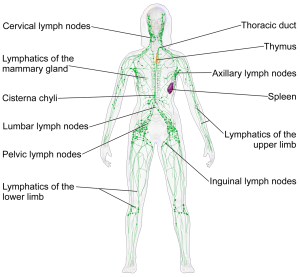What does the lymphatic system do? (5 functions)
The lymphatic (or lymph, for short) system is a network of vessels, tissues, and organs that work together to maintain fluid balance, remove waste products and toxins, and support the immune system. These are the 5 functions of the lymphatic system.
1. Fluid balance – the lymphatic system collects excess fluid, called lymph, from the body’s tissues and returns it to the bloodstream. This helps prevent the accumulation of fluid and swelling in the tissues.
2. Immune response – the lymphatic system plays a crucial role in the body’s immune defence. Lymph contains immune cells, such as lymphocytes, which help identify and destroy pathogens (disease-causing microorganisms) and foreign substances. These cells travel through the lymphatic vessels and lymph nodes, where they encounter and respond to antigens (foreign substances).
 Lymphatic system
Lymphatic system
3. Absorption of fats – the lymphatic system absorbs dietary fats and fat-soluble vitamins from the digestive system. Specialised lymphatic vessels called lacteals in the small intestine take up these substances and transport them to the bloodstream for distribution to the body’s cells.
4. Waste removal – the lymphatic system collects and transports cellular waste products, toxins, and other debris from tissues. These waste materials are filtered and eliminated by the lymph nodes and other lymphatic organs.
5. Transport of immune cells – the lymphatic system facilitates the movement of immune cells throughout the body. Lymphocytes and other immune cells are transported via lymphatic vessels and circulated through lymph nodes, where they can encounter and respond to antigens.
Overall, the lymphatic system plays a vital role in maintaining the body’s fluid balance, supporting immune function, and aiding in the removal of waste and toxins.
Summary
We have described what does the lymphatic system do – and its 5 functions. We hope it is clearer now.

